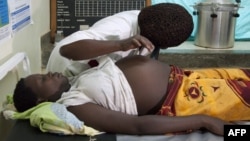In Uganda, a court case involving two women who died in childbirth at government hospitals could have widespread legal implications. A Supreme Court ruling in the matter has opened the door to lawsuits in cases where the government fails to provide proper healthcare.
The two women died during labor at government hospitals in 2009 and 2010, after medical staff refused to treat them because they couldn't pay bribes. Childbirth care is supposed to be free in Uganda.
According David Kabanda, the lawyer representing the families of the two women, the government is responsible for their deaths.
“Who is supposed to build hospitals? It’s the government. Who is supposed to facilitate hospitals with enough skilled manpower? Enough health commodities and other goods? It’s the government,” said Kabanda.
The Constitutional Court refused to hear the families' initial petition, filed in 2011. Judges said they didn't have authority to rule on matters such as hospital budget allocation, which is under the executive branch.
But Uganda's Supreme Court dismissed that decision in November and ordered the lower court to hear the case.
Peter Walumbiri, a constitutional expert, said the ruling of the Supreme Court is a significant one.
“This decision opens the door for litigation in this area. It opens the door for the courts to now scrutinize government policies, government actions, government omissions. It has far-reaching implications if the public in Uganda were to take advantage of this landmark decision,” said Walumbiri.
Experts don't expect the courts to be flooded with petitions any time soon, but Salima Namusobya of the Initiative of Social and Economic Rights said they are preparing cases that could take advantage of this new precedent.
“In my organization, there are also cases to do with, for example, budgets for education, but also issues to do with failure to provide education for particular groups of people. So there are places for example that do not have public schools and you would be arguing issues of equality and non-discrimination, because these are places that are supposed to benefit equally from public resources like the rest of Uganda,” said Namusobya.
Kabanda said the case of the two women who died is already having an impact.
“From when we filed the petition, we’ve seen numerous changes from the government. We have seen them do maternal death audits. We’ve seen them increase on the number of health workers…We have even recently sued a local government which did not supervise its health workers and which resulted into deaths and they’ve been condemned in costs. They’ve been condemned to pay damages,” said Kabanda.
Uganda's Constitutional Court is expected to take up the case of the deceased women sometime early next year.




